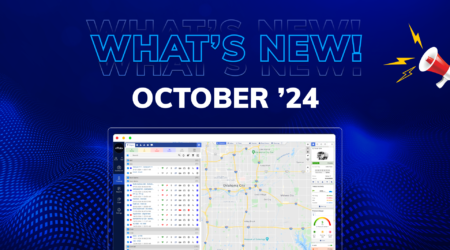From Warehouse to Delivery: How Logistics Fleet Management Software Works
In today’s fast-paced world, the logistics industry plays a pivotal role in ensuring goods reach their intended destinations efficiently and on time. To achieve this, logistics companies rely heavily on cutting-edge technologies and software solutions. One such essential tool is the Logistics Fleet Management System. In this comprehensive guide, we will delve deep into the world of logistics fleet management, exploring how it works and its crucial role in the industry. We will also connect the dots to your advanced waste collection software, highlighting the trends that are shaping the future of logistics. So, fasten your seatbelts as we embark on this journey through the logistics world!
Understanding Logistics Fleet Management System
Logistics Fleet Management System is the backbone of any modern logistics operation. It is a sophisticated software solution designed to streamline the management of a fleet of vehicles, optimizing their routes, monitoring their performance, and ensuring the safe and timely delivery of goods. Let’s break down the key components and workings of this system.
-
Vehicle Tracking and Monitoring
At the heart of Logistics Fleet Management System is vehicle tracking and monitoring. GPS technology is used to track the real-time location of each vehicle in the fleet. This information is crucial for route optimization, as it allows logistics managers to make on-the-fly adjustments and reroute vehicles to avoid traffic, bad weather, or other unforeseen obstacles. It also helps in keeping customers informed about the estimated time of arrival (ETA) of their shipments.
-
Route Optimization
Route optimization is a game-changer in logistics. The Logistics Fleet Management System analyzes various factors, such as traffic conditions, fuel efficiency, and delivery schedules, to determine the most efficient routes for each vehicle. It also plays a crucial role in cost reduction, as it ensures that fewer resources are wasted on unnecessary detours.
-
Performance Monitoring
To ensure that vehicles are operating at peak efficiency, the Logistics Fleet Management System monitors their performance in real-time. This includes tracking engine health, fuel consumption, and driver behavior. Any anomalies or issues are flagged immediately, allowing for timely maintenance and reducing the risk of breakdowns that could disrupt the supply chain.
-
Inventory Management
Effective logistics fleet management extends beyond the vehicles themselves. It also includes managing the inventory within those vehicles. LFMS allows logistics companies to keep track of the goods being transported, ensuring that the right products are delivered to the right destinations. This is especially critical in industries with perishable goods or strict compliance requirements.
-
Communication and Collaboration
Communication is key in logistics, and Logistics Fleet Management System facilitates it by providing a platform for real-time communication between drivers, dispatchers, and customers. This ensures that everyone involved in the logistics process is on the same page, reducing the chances of misunderstandings or delays.
Connecting the Dots: Advanced Waste Collection Software
Now, let’s connect the dots between logistics fleet management and your advanced waste collection software. While these two may seem unrelated at first glance, they share a common thread – efficiency and optimization. Just as the Logistics Fleet Management System ensures the efficient delivery of goods, waste collection software ensures the efficient collection and disposal of waste.
-
Route Optimization in Waste Collection
Similar to the logistics industry, route optimization is a critical component of waste collection. Waste collection software analyzes data on collection points, waste volume, and disposal facilities to optimize the routes for waste collection trucks. This not only reduces fuel consumption but also minimizes the environmental impact of waste collection.
-
Asset Management
Just as LFMS manages the fleet of logistics vehicles, waste collection software manages the fleet of waste collection trucks. It tracks their location, monitors their performance, and schedules maintenance when needed. This proactive approach reduces downtime and ensures that waste collection services run smoothly.
-
Inventory Management for Waste
Waste collection software also includes inventory management features, keeping track of the types and quantities of waste collected. This is particularly important for compliance purposes, as different types of waste may have specific disposal requirements.
Trends in Logistics Fleet Management System
As technology continues to evolve, so does the world of logistics fleet management. Here are some of the trends that are shaping the future of this industry:
-
Internet of Things (IoT) Integration
The integration of IoT devices into logistics vehicles is becoming increasingly common. These devices provide real-time data on vehicle performance, cargo conditions (such as temperature and humidity), and driver behavior. This data allows for even more precise monitoring and optimization of the entire logistics process.
-
Artificial Intelligence (AI) and Machine Learning
AI and machine learning algorithms are being used to analyze vast amounts of data generated by Logistics Fleet Management System. They can predict maintenance needs, optimize routes, and even provide recommendations for fuel-efficient driving. The more data these systems analyze, the smarter and more efficient they become.
-
Sustainability and Green Logistics
Environmental sustainability is a growing concern in the logistics industry. Logistics Fleet Management System is being used to support green logistics initiatives by optimizing routes to reduce emissions, promoting fuel-efficient driving, and even incorporating electric and hybrid vehicles into fleets.
-
Customer-Centric Solutions
The logistics industry is becoming more customer-centric, with a focus on providing transparency and convenience. LFMS is evolving to include features like real-time tracking for customers, automated delivery notifications, and easy-to-use customer portals.
-
Autonomous Vehicles
While still in the experimental stage, autonomous vehicles are on the horizon for logistics. Logistics Fleet Management System will play a crucial role in managing and optimizing fleets of autonomous trucks and drones, potentially revolutionizing the industry.
Conclusion
In conclusion, logistics fleet management systems play the role of unsung heroes in the logistics industry, ensuring the efficient and timely delivery of goods. Their role in optimizing routes, monitoring vehicle performance, and managing inventory is invaluable. When we connect the dots to advanced waste collection software, we see the common thread of efficiency and optimization.
As the logistics industry continues to evolve, trends like IoT integration, AI and machine learning, sustainability, customer-centric solutions, and autonomous vehicles are reshaping the way logistics fleet management systems operate. These advancements not only improve efficiency but also contribute to a more sustainable and customer-focused industry.





